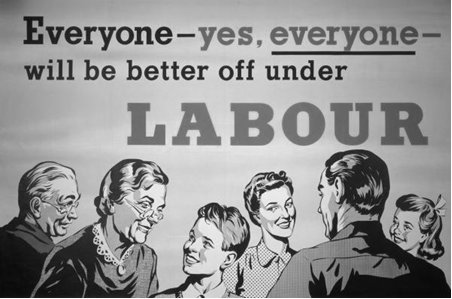Time to read between the lines. 
...Because who wants to fight Germans?
...We did shoot some Germans, so we did technically defend ourselves.
...Who says selling out is a bad thing?
...By working, we mean telling them what to do.
...We hate socialism. You should hate socialism. Socialism should hate socialism.
...Not only that, we can give everyone in Britain rose-colored glasses.
...That way, the future of our nation won't hate us.
There is peace in Europe. By able negotiation Viscount Halifax and Mr Butler have secured for Britain and her Empire a just and fair settlement which has brought home our proud forces.
...Because who wants to fight Germans?
By showing our determination to defend ourselves the Conservative Party has shown that it is the only party that can be trusted to maintain Britain’s crucial role internationally.
...We did shoot some Germans, so we did technically defend ourselves.
Our cities are intact and our independence guaranteed. This is the Conservative Party’s achievement. We will protect this achievement, making your safety our main concern.
...Who says selling out is a bad thing?
We will maintain strong and modernised forces on land, sea and in the air. We will work with the Commonwealth and other nations to make the world a safer place.
...By working, we mean telling them what to do.
We have been prudent with the nation’s finances. We will not pledge to remove every problem – only socialist fantasy allows such unrealistic dreaming. Under the Conservatives farmers will not live in fear of socialist land seizures. Under the Conservatives our soldiers, sailors and airmen will not be tossed aside upon the heap of demobilisation. Under the Conservatives industry will not be burdened by bureaucratic state control.
...We hate socialism. You should hate socialism. Socialism should hate socialism.
The Conservatives offer progress. Working with our bankers, farmers, workers rather than against them we offer the hand of friendship to move forward together. Food production will be encouraged, not forced, to ensure that prices remain affordable for all yet profitable for the farmer and his workers that grow them. By encouraging coal and factory production rather than over-burdening it with a faceless socialist monolith we ensure that employment opportunities abound for all. Workers will be protected by cooperation with employers, supported by the State, rather than a Trade Union movement detached from the true aspirations of the people it represents. By assisting the building industry employment and welfare possibilities become reality.
...Not only that, we can give everyone in Britain rose-colored glasses.
By using our strong world position to negotiate the removal of protectionist measures we will stimulate international trade, boosting our economy. By working to educate and nurture our nation we will provide a strong foundation for the future of our nation.
...That way, the future of our nation won't hate us.




